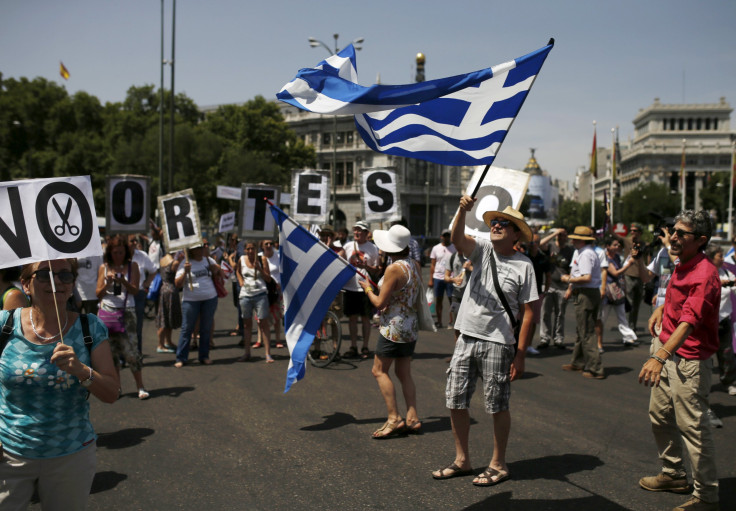Greek Referendum Results 2015: Opinion Polls Show A 'No' Vote Will Likely Prevail

UPDATE 2 p.m. EDT: Greek officials projected a solid win for a "no" vote, the Interior Ministry predicting it would garner 61 percent, the Associated Press reported.
BREAKING: Greek interior ministry projection says 'no' camp will get more than 61 percent of vote.
- The Associated Press (@AP) July 5, 2015
UPDATE 1:30 p.m. EDT: With 12 percent of the vote counted, "no" was ahead by 20 percent in all regions in Greece, the BBC reported.
Original post:
Greeks went to the polls Sunday in a pivotal referendum that could determine the country's future within the eurozone. Three opinion polls, GPO, Metron Analysis and MRB, suggest a "No" vote will likely prevail, meaning Greeks have rejected the austerity demands of international creditors. The vote does not ultimately decide Greece’s fate in the 19-member currency block.
A separate poll by Marc forecasts a 49.5 to 54.5 percent of Greeks voted “No” compared to 45.5 to 50.5 percent voting “Yes,” Reuters reported.
The government has said it would broker a deal with lenders in 24 hours if there was indeed a “No” vote. However, economists fear a “Grexit” could ensue where Greece would leave the eurozone.
Greek Prime Minister Alexis Tsipras has maintained a vote against the bailout would allow him to renegotiate with the country’s creditors in a stronger position. The result, he said, would be a new bailout deal with better terms. The international creditors, however, have said they are unwilling to renegotiate. If that’s true, and opposition voters prevail in the referendum, Greece risks an exit from the eurozone.
Greeks who voted "Yes" in the referendum were casting a vote in favor of is an acceptance of bailout funds in exchange for Greece agreeing to budget cuts and other austerity measures set forth by the country’s three creditors -- the International Monetary Fund, the European Central Bank and the European Commission -- sometimes referred to collectively as the troika.
Talks between Greece and its international creditors have stalled multiple times in the last four months. Greece struck a deal with the European Union (EU) in February to get 7 billion euros ($8 billion) in extra bailout funds, in exchange for economic reforms. The deal specified that the funds would not be released until Tsipras’ leftist government submitted reform plans that were approved by the troika.
Greece was renegotiating the terms of its now $270 billion bailout program after the far-left Syriza Party won elections in January. Before the national elections, the Syriza Party, led by 40-year-old Tsipras, had staged a revolt against the budget cuts and other painful austerity measures mandated under the bailout. The previous conservative government of Greece had agreed to those bailout terms.
The major obstacles during negotiations have been pension reforms and VAT discounts for the Greek islands.
© Copyright IBTimes 2024. All rights reserved.






















